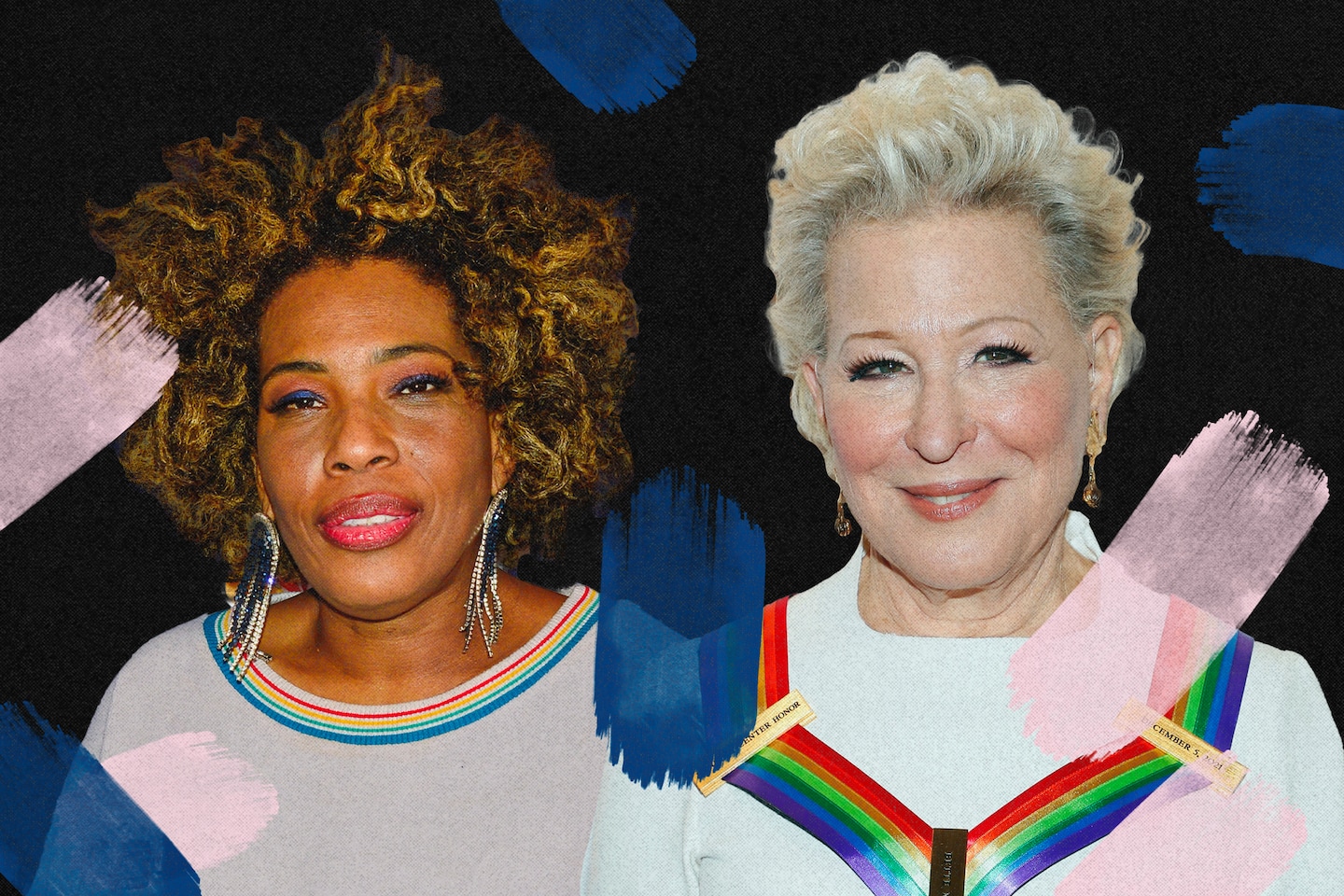“They don’t call us ‘women’ anymore; they call us ‘birthing people’ or ‘menstruators,’ and even ‘people with vaginas’! Don’t let them erase you! Every human on earth owes you!” she added.
WOMEN OF THE WORLD! We are being stripped of our rights over our bodies, our lives and even of our name! They don’t call us “women” anymore; they call us “birthing people” or “menstruators”, and even “people with vaginas”! Don’t let them erase you! Every human on earth owes you!
— bettemidler (@BetteMidler) July 4, 2022
The same day, an interview between media personality Piers Morgan and singer Macy Gray aired in which Morgan brought up the controversy over trans athletes competing in women’s sports.
“I will say this, and everyone’s going to hate me, but as a woman, just because you go change your [body] parts, [it] doesn’t make you a woman. Sorry,” Gray said.
Both entertainers were trending on social media this week as transgender advocates and allies called out what they saw as transphobic remarks.
Journalist Soledad O’Brien responded to Midler’s tweet: “Love you lady, but no one’s stripping me of my name. … I think it’s a way to be inclusive of people who need a wide range of health care options.”
Another Twitter user wrote: “It’s not trans people who are taking away my right to bodily [autonomy]. We’re all fighting the same fight.”
Some on social media referred to the celebrities as “TERFs,” an acronym for “trans-exclusionary radical feminists” — and drew comparisons to author J.K. Rowling, who has come under criticism from trans advocates in the past. (On Tuesday, Rowling seemed to support Gray’s comments, tweeting, “Today feels like a good day to ensure I’ve bought Macy Gray’s entire back catalogue.”)
Midler and Gray, who have long been seen as allies to the LGBTQ community, responded to the criticisms Tuesday. In a tweet, Midler said her statement was in response to a “fascinating and well written” opinion piece that ran in the New York Times over the weekend, which argued that “women” was becoming a forbidden word, edged out by gender-neutral terms such as “pregnant people.”
“There was no intention of anything exclusionary or transphobic in what I said; it wasn’t about that,” Midler wrote.
In a statement shared with The Washington Post, Gray said: “I have nothing but love for the LGBTQ+ and transgender community and have been a supporter since day one. My statement on Piers Morgan was grossly misunderstood. I don’t hate anyone. I respect everyone’s right to feel comfortable in their bodies and live their own truth.”
Many trans advocates and allies saw in Midler and Gray’s comments the kind of talking points typically associated with anti-trans feminists, who are also known as “gender critical” feminists.
These anti-trans feminists have recently found common ground — and increasing visibility and power — with conservative evangelical Christians, a group that has been largely credited with mobilizing, politically and socially, to curtail abortion and other reproductive rights.
Midler and Gray’s remarks are also coming at a significant time for both trans people and cisgender women, experts note: Both groups are widely seen as the most invested in — and vulnerable to — a recent rollback of reproductive rights and bodily autonomy.
Given the political moment, it’s no wonder the two celebrities touched off a conversation about transphobic language, defining womanhood and more. We asked advocates and experts to contextualize what’s at play.
In the past decade, TERF has become increasingly common as a shorthand way of identifying a person who self-identifies as a feminist but is unwilling to include transgender women and girls in their advocacy — and more frequently, have actively sought to exclude trans women from women’s spaces.
They were considered a fringe offshoot of the women’s right movement of the 1970s and are still a relatively small group, according to Heron Greenesmith, a senior research analyst for LGBTQ justice at Political Research Associates, a left-leaning social justice research and strategy organization. In recent years, Greenesmith has been monitoring and studying anti-trans feminists.
What interests Greenesmith about this group is how it adopts feminist principles “while actually undermining bodily autonomy … one of those foundational principles of feminism,” they said.
Proponents of anti-trans feminism have argued that trans women diminish the power and rights of cisgender women. Originally, “TERF” referred to a specific, radical feminist ideology, but in recent years it has become an umbrella term to describe anyone who opposes trans rights or advocacy in the name of feminism.
Some anti-trans feminists have said they consider the TERF acronym to be a slur, favoring the phrase “gender critical” instead.
‘A problem of language’
The fact that Midler and Gray, who both consider themselves allies of the LGBTQ community, could knowingly or unknowingly spout anti-trans rhetoric is a sign of how much that messaging has proliferated in the mainstream, experts say.
According to Jules Gill-Peterson, an associate professor of history at Johns Hopkins University, Midler’s tweet — and the New York Times opinion piece that inspired it — are rooted in a panic over language. But that focus actually diminishes the concerns of trans people at large, Gill-Peterson said.
“My reading on the panic around gender-neutral or gender-inclusive language is that it’s basically disingenuous,” Gill-Peterson said. “I don’t think any trans organizers, advocates or trans people would name gender-inclusive language as the No. 1 most urgent issue trans people are facing in the United States.”
In recent years, many U.S. medical and governmental institutions, advocacy groups and media organizations, including The Washington Post, have moved to adopt more gender-neutral language — part of a larger, worldwide trend of making gendered language more inclusive of transgender, nonbinary and gender-nonconforming people. The fight over abortion rights has magnified this effort — as well as criticism of it.
While LGBTQ advocates and allies have noted that trans men and nonbinary people also seek abortions — and often encounter systemic barriers and discrimination along the way — these same individuals and organizations have often reiterated the importance of recognizing cis women in these conversations.
In recent guidance shared on Twitter, the Trans Journalists Association wrote: “It is unnecessary to avoid the word ‘women’ by substituting phrases like ‘birthing people,’ ‘people with uteruses,’ and the like. This language can offend both transgender and cisgender people.”
Gill-Peterson sees the furor over language such as “birthing people” as a “sort of attempt to drive a wedge” between groups that are actually aligned in their goal of protecting bodily autonomy and self-determination: “Sometimes these language games are actually a way of further delegitimizing everyone involved.”
‘Different ways to be women’
On the other hand, Gray’s comments, which focused on how one cannot change their body parts and be considered a “woman,” appear to tie back to the larger issue of “gender essentialism,” or the idea that the only genders are male and female and are defined by certain physical characteristics, said Greenesmith.
While the urge to define what womanhood is has been around for some time, the question of how one defines a woman has been a recurring fixation among conservatives this year.
Supreme Court Justice Ketanji Brown Jackson was asked how she would define a woman during her confirmation hearings, for example. And at a GOP event earlier this year, Rep. Marjorie Taylor Greene (R-Ga.) said that she had an “easy answer”: “We’re a creation of God. We came from Adam’s rib.”
Speaking with Morgan, Gray said: “Being a little girl is a whole epic book, you know? And you can’t have that just because you want to be a woman.”
The comments echo a transphobic trope that trans people are deceitful or duplicitous, said Greenesmith. Gray’s remarks also erase the experiences of trans children, and trans girlhood specifically, they said.
This is personal for Greenesmith, who said that it has been an “astonishing revelation” to realize that “I wasn’t raised as a girl. I was raised as a nonbinary person.”
“That is the same thing that trans women say: ‘I wasn’t raised as a man. I was told that everything I did was wrong and shaped into, sometimes violently, what a man should be,’ ” Greenesmith said.
In Gray’s comments, Gill-Peterson sees the more established problem of defining who a proper girl or woman is — what they look like, what their background is, how they behave.
“There’s no one criteria that all women share. Particularly when we think about how race, class and disability cut through and divide women as a class of people,” she said. “You’re just slowly, slowly shrinking the population of people who are deserving of recognition and deserving of dignity and humanity and personhood.”



